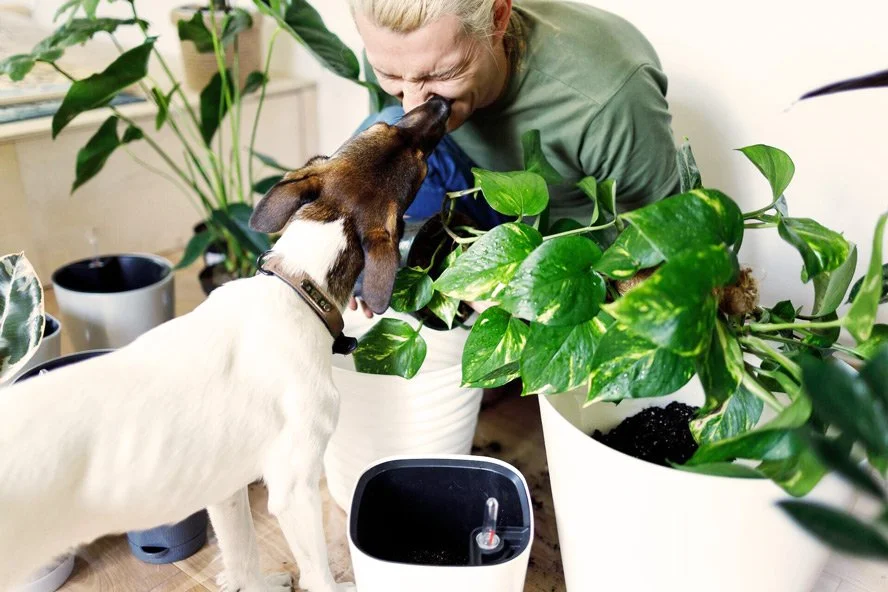cover: StockSnap | Pixabay
Why do dogs lick people's ears? Does your dog like to lick your ears? But what does it mean and why does he do it? We explain where this dog behaviour comes from and whether it can be harmful to you. We also give you simple tips on how to stop your dog licking your ears.
A dog licks another dog's ear out of affection.
image: falco | Pixabay
What is my dog trying to tell me by licking my ears?
Dog behaviour can sometimes seem strange. Although we humans would never lick each other's ears, dogs seem to take great pleasure in it. They like to lick other dogs, but also humans or other animals on various parts of their body, because for pack animals licking is primarily a means of communication. They learn this behaviour as puppies from their mother, who licks them extensively and frequently. This is not only to clean and massage the belly after drinking, but also to bond and show affection. Puppies adopt this behaviour and lick each other. Some dogs retain this behaviour into adulthood, others lose it.
Dogs licking each other's ears and muzzles or nibbling each other's ears is a sign of affection. It is also used as a friendly greeting, a spontaneous expression of friendship or a sign of joy. And because dogs see humans as members of the pack, they use this principle with us too. By licking your ears, your dog is showing you that he likes you very much. At the same time, licking can be an invitation to pet or play.
Licking other dogs' lips is more of a gesture of submission. Your dog will lick your mouth out of submission, especially if you are tense or loudly scolding him. This is his way of calming you down.
However, it is also possible that the licking has nothing to do with the other person and is just a way for the dog to calm down. Or he may just like the taste of your ears, mouth and skin.
Are there any health concerns for people if the dog licks?
For hygiene reasons, we advise against letting your dog lick your ears and face. Not only are dogs known to lick their own bottoms, but they are also interested in unhygienic things such as faeces or dead animals. Dogs that eat raw meat also ingest pathogens.
As a result, they can transfer parasites and pathogens to us when they lick us, which can lead to parasite infestations and serious infections. The risk of this is increased if the pathogens get deeper into the ear, mouth or wound. It is also theoretically possible to develop an ear infection, meningitis or septicaemia. People with weakened immune systems, such as children, the elderly or the sick, are particularly susceptible. Dogs are not usually affected by the bacteria.
Wash your hands if you have been licked by a dog. If you touch your eyes with an unwashed hand, eat with your hand or prepare food, you can spread germs and cause infections.
To reduce the risk of your dog ingesting pathogenic bacteria, you should not feed him raw animal products such as meat or offal. It is better to cook these foods in homemade rations or use commercial dog food, as heating kills the bacteria.
If your dog licks your face or ear, you should turn away and ignore it for a moment.
image: Kadim Kaipov | Unsplash
How do I stop my dog licking my ears?
Licking ears and faces is a natural behaviour in dogs. However, even puppies and young dogs should learn that this behaviour is undesirable and doesn't lead to anything. It's not difficult to teach your dog this behaviour. Start as early as possible.
Here's how: If your dog licks your face or ear, you can simply turn away and ignore him for about 30 seconds. This will interrupt the social interaction and your dog will realise that he has achieved the opposite of what he intended by licking you. On the other hand, you should only use petting to reinforce desired behaviour, such as when your dog shows you affection in other ways.
However, if your dog licks other animals or people excessively, i.e. constantly, this is problematic and may be classed as a behavioural disorder. In this case, you should contact a dog trainer.
Conclusion
When dogs lick ears, they usually want to show affection or get attention. However, this behaviour is a health risk for humans. However, you can easily teach your dog to refrain from this behaviour.
The confidu magazine is written by our veterinarians according to current scientific standards. The articles do not replace a veterinary diagnosis, but are intended to provide you with initial information on many topics related to your animal. If you have specific questions about your pet, our vets will be happy to advise you via the confidu app.







